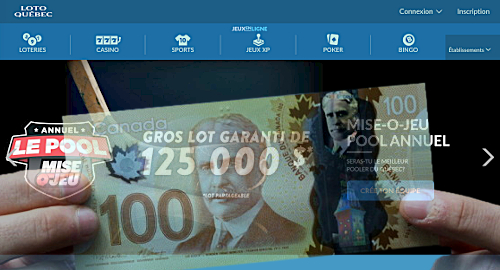 Quebec’s online gambling monopoly reported revenue up more than one-third in the first quarter of its current fiscal year, driven largely by larger lottery jackpots.
Quebec’s online gambling monopoly reported revenue up more than one-third in the first quarter of its current fiscal year, driven largely by larger lottery jackpots.
Last week, the Loto Quebec provincial gaming monopoly reported revenue of C$686.5m (US$521.5m) in the three months ending June 25, a 6.4% improvement over the previous year’s Q1. Net income fared even better, rising 10.7% to C$359.8m.
The mainstay lottery division was responsible for most of the gains, as a string of larger Lotto Max jackpots pushed lottery revenue up 22.5% to C$244.4m. Lotto Max sales jumped over 71% to C$62.3m, representing more than one-quarter of all lottery sales, thanks in part to a record-breaking C$60m prize won on June 8 by a Quebec resident.
Revenue at the province’s four land-based casinos was essentially flat at C$213.5m, due in part to the Casino de Montreal playing unlucky during the period. But Loto Quebec maintains that the most recent quarter had one less day than the previous period, and that casino sales would have actually risen 1.4% had the extra day been included in the current results.
The ‘gaming establishments’ division reported revenue falling 1.4% to C$234m, due to the government’s ongoing efforts to reduce the number of video lottery terminals in the province’s bars, clubs and bingo halls.
As for Loto-Quebec’s online gambling site Espacejeux.com, overall revenue improved 34.9% to C$21.6m. Online lottery sales improved nearly 61% to C$7.1m, while online casino products gained 18.5% to C$16.5m
Espacejeux’s performance continues to trail well behind that of its provincial counterpart in British Columbia, despite Quebec having around 3.5m more residents than BC. On the plus side, Espacejeux continues to outshine its rival in neighboring Ontario, which has 5m more residents than Quebec.
Espacejeux’s future growth plans were dealt a blow in July when Quebec Superior Court justices struck down the province’s plans to require internet service providers to block the domains of internationally licensed gambling operators serving Quebec punters.
These plans, as detailed in the government’s controversial Bill 74, were declared unconstitutional after the court failed to buy the government’s insistence that the plan was about protecting the health of consumers rather than shoring up Loto Quebec’s bottom line.
The same week that the court ruling was made public, Quebec Health Minister Gaétan Barrette unveiled a plan to spend an additional C$35m on programs to deal with Quebecers’ addiction issues, and specifically cited online gambling problems in addition to opiates and other drugs. The court ruling was actually issued in July, so cynics can decide for themselves whether the online gambling plank was added to the health platform in response to the province’s legal setback.
Quebec is currently embroiled in a provincial election, and the current polling frontrunner is the new Coalition avenir Quebec (CAQ) party. Last week, the CAQ unveiled its financial platform, which included a plan to require all Crown corporations — including Loto Quebec — to boost their net yield by 7%, with the gains expected to be primarily derived via efficiency efforts. Quebecers go to the polls on October 1.





